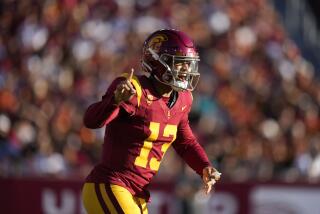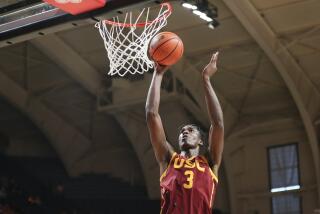Pullman Life Was No Party
Melvin “Champ” Simmons left Washington State 14 months ago confused and disillusioned, his sense of justice shaken.
A hard-hitting linebacker on the football field, Simmons was beaten so badly at a fraternity party that he was hospitalized. But prosecutors delivered a more painful blow when they decided not to file charges in the case, citing conflicting witness reports.
Simmons, recalling the moment his mother broke the news to him, leaned forward in his chair at USC’s Heritage Hall, rubbed his face and spoke in a soft tone of resignation.
“It hit me, ‘Wow, look how crooked life can be,’ ” he said. “I just became real down about life. I had a picture of what’s right. I had faith in the system.
“At that moment, I couldn’t figure out if I wanted to cry or get mad, because I was so mind-boggled.”
Now, more than at any time in his football career, Simmons realizes he must keep his emotions in check this week. The USC linebacker will try to vent his anger before he steps onto the field Saturday at Washington State to face his former team.
The game will mark Simmons’ first return to Pullman, Wash., since he left in August 2001, and he doesn’t want any painful memories to affect his play.
“I want to get all my frustration out the night before the game, so I’m not trying to play overzealous,” he said. “When I’m like that, I tend to make mistakes, and that’s not what I want to occur.”
So far, Simmons has been a picture of consistency in his first season playing for USC. The 6-foot-1, 215-pound junior ranks second among the Trojans in tackles and has earned praise from coaches and teammates for his intensity and leadership.
“He’s a real instinctive player,” Coach Pete Carroll said. “He’s a natural at [linebacker] and has a feel for plugging holes and scrapping and adjusting to plays. He understands the game well.... I expect him to have a really good year.”
Simmons was hungry to play again after having to sit out last season because of his transfer. Considering that he played against USC as a freshman and sophomore, it’s understandable that the Compton native felt awkward in his initial days on campus last fall.
But those feelings quickly dissipated as Simmons made his mark in practice and began to identify with the Trojans.
“It was hard at first because I didn’t feel like an SC guy,” he said. “Instead of looking at them as [opponents], I had to grasp the idea of them being a part of me, and me being a part of them.”
Now, he said, “I couldn’t imagine a situation [where] I could be more happy.”
There was a time when Simmons thought Washington State was the right fit. He liked the idea of going away to school after playing at Compton Dominguez High. He made friends and developed a good relationship with Coach Mike Price, whom he still holds in high regard.
After playing on special teams as a freshman, Simmons started 10 games as a sophomore and led the Cougars with seven sacks. His place on the team seemed secure: a defensive leader with a bright future.
But Simmons’ attitude toward Washington State and the surrounding area changed.
On March 30, 2001, a Friday, Simmons said he went out by himself about 9 p.m. and ran into a teammate, Patrick Henderson, outside a Pullman bar. Simmons said Henderson invited him to a party at his fraternity house later that night.
“He told me to come at 12 o’clock,” Simmons recalled. “He was going to let me in.”
However, when Simmons got to the Pi Kappa Alpha fraternity house, he couldn’t find Henderson. Instead, he found several teammates and other Washington State athletes outside the front door, trying to get in.
Minutes later, Simmons said he saw a teammate who had tried to crash the party getting the bum’s rush by a group of fraternity members.
“I tried to pull them off of him,” he said. “That’s when I got pretty much dog-piled.”
Al Genatone, now a starting linebacker for the Cougars, said he pulled Simmons out from under the pile of bodies.
“He was sticking up for one of our guys, all by himself, when a mob jumped him,” Genatone said. “He got caught on the ground.”
When Genatone went to check on Simmons the next day in his dorm room, he was shocked by what he saw.
“His face was pretty swollen,” he said. “I was scared.”
Genatone drove his friend to the hospital. Simmons had suffered a concussion, a broken facial bone and a broken thumb. His nose and mouth were numb because of nerve damage. Some witnesses reported he had been kicked several times while on the ground.
Simmons’ parents were notified by Washington State coaches, and their response was swift. They wanted their son home immediately. A few days after the incident, Simmons flew home with his mother, Kathleen, taking all of his possessions.
Simmons said his parents screened calls from Cougar coaches, telling them he wasn’t coming back. But then he had a change of heart.
“The problem,” he said, “was that I [left school] for my parents.”
Three weeks after leaving, Simmons returned to Washington State, ready to make the best of an uncomfortable situation. Soon after, the university imposed sanctions on the Pi Kappa Alpha fraternity for violence and alcohol issues.
Simmons’ father, Melvin Sr., said he believed authorities knew who had kicked his son and were close to making an arrest. The family alleges there were racial overtones in Simmons’ beating. Most of the fraternity members were white; Simmons is black.
“The police called us and said they had a suspect,” Melvin Sr. said. “We felt good about that.”
Prosecutors, though, said they hit a dead end in their investigation because of conflicting witness reports.
“Nothing could be established beyond a reasonable doubt,” said Jim Kaufman, a Whitman County prosecutor. “There were several versions of what happened.”
Another prosecutor, David Stevens, said Simmons himself had been a suspect in the melee.
“After extensive interviews with witnesses, basically it turned out that the clearest picture we had of what happened was that Mr. Simmons assaulted someone,” said Stevens, now a Spokane County deputy prosecutor. “How he came to get his injuries we could never prove. Whether he was kicked, as he alleged, or, as other witnesses said, he could have hurt himself when he fell.”
Genatone said that in the confusion, he didn’t see Simmons get kicked. But he has little doubt that is what happened.
“A fight is one thing, but when someone gets kicked on the ground you can get killed,” Genatone said. “There was just a big pile of guys. It got out of control. It happened in 30 seconds. It was hard to tell what happened. All [investigators] could get was who was there.”
Then, in a moment of reflection, Genatone assessed blame.
“I think we all were [at fault],” he said. “We should have just left [the party] and let things be.”
The fallout, at least for Simmons, was losing trust in some of his teammates.
“I felt that I had teammates who were [members] in the frat house that would not tell who had kicked me,” he said. “Once that happened, that blew my mind.”
All that summer, Simmons wavered on whether he would leave Washington State. When he learned that prosecutors had dropped the case, only days into training camp before the 2001 season, it was the last straw.
“That’s when I said, ‘All right, Ma, this isn’t for me,’ ” he recalled. “Being here any longer is not going to be for me. It’s not going to help my [healing] process. I actually started crying.”
After withdrawing from Washington State, Simmons had two weeks to find another school. His family contacted USC, where Simmons’ younger brother Marvin, a former standout linebacker at Long Beach Poly High, had signed a letter of intent.
Marvin did not enroll at USC after his test scores were challenged, but the Trojans were receptive to his older brother joining the team. Although athletes normally are required to sit out two years if they transfer from one Pacific 10 Conference school to another, Simmons sat out only one year, the NCAA requirement, after the conference rule was waived for him.
Price, Washington State’s coach, helped clear the way by writing a letter on Simmons’ behalf, an act of generosity that has not been forgotten by the former Cougar.
“That just made everything possible for me to come to SC,” Simmons said. “It made me have a better attitude about life, that I could still have some trust that there are good people out there, even in the town of Pullman.”
Of Saturday’s game, Price said, “It will be strange to see Champ Simmons on the other sideline.”
It will be strange for Simmons too. He acknowledges having a curious relationship with his former school. Sometimes, in fits of anger, he curses Washington State. Other times, he revels in the football team’s success.
“I had a lot of fine relationships while I was there,” he said.
Always lingering, though, is a sense of bitterness about Pullman and its inhabitants.
“As far as that city and area are concerned,” he said, “I have so much built-up anger that just can’t wait to be let out.”
More to Read
Go beyond the scoreboard
Get the latest on L.A.'s teams in the daily Sports Report newsletter.
You may occasionally receive promotional content from the Los Angeles Times.






